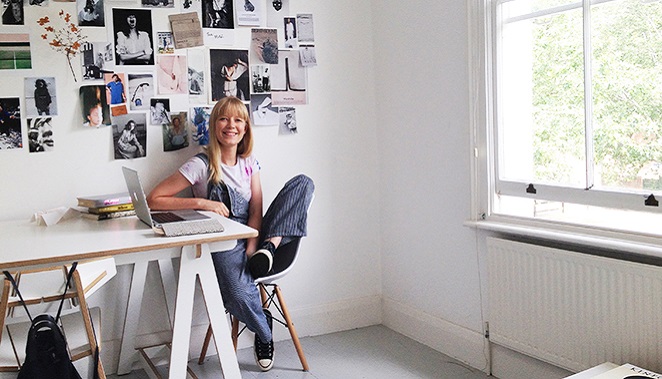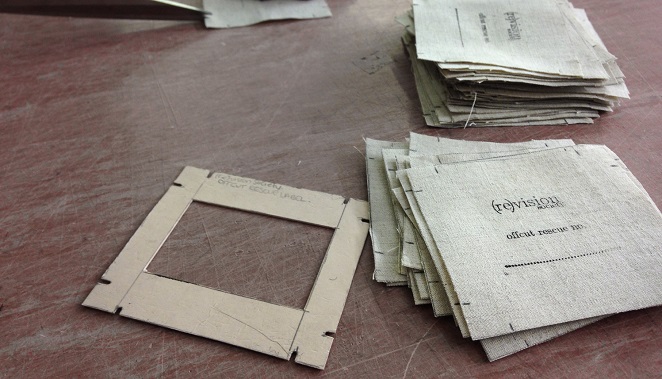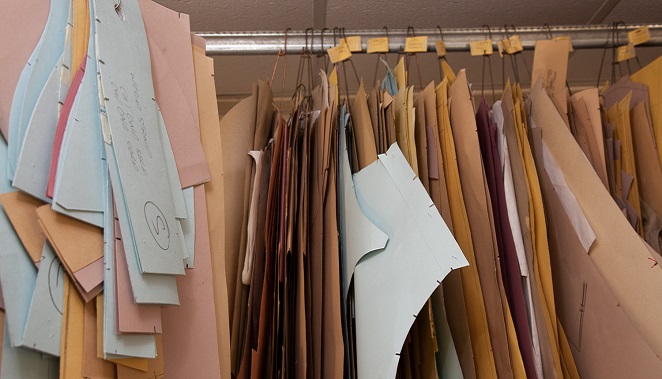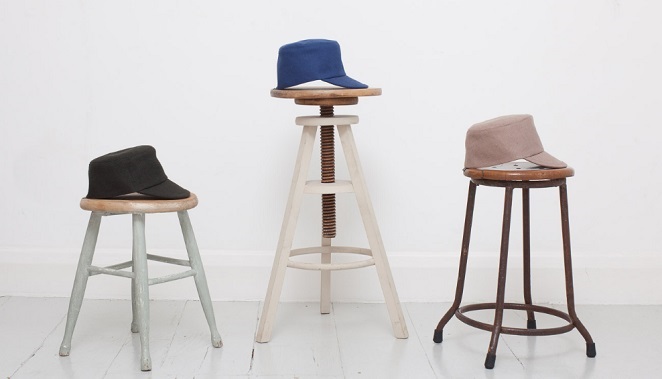
White T-shirt Stories
2nd August 2016
Collaborations & Conversations | 0 Comments
Back
White T-shirt Stories is…
A series of candid conversations with interesting people, uncovering their values and style.
Stacey Cotter Manière is…
The co-founder of (re)vision society, a luxury clothing label sourcing and reimagining the offcuts from London’s clothing manufacturers. Stacey works from her studio in London Fields.

Q&A
EON: You’re wearing what looks like an especially original white t-shirt today, where is it from, how long have you had it and why is it your favourite?
SCM: I wouldn’t say I have one particular favourite, but today I am wearing one of my favourite t-shirts. I’ve had it a long time but it started to turn grey from over washing. I wanted to make it into a rag t-shirt because I always try to prolong the life of anything when I can. Then I started to use it as an art rag t-shirt and my sister and I sort of just wipe oil pastels on there, or anything that we’re using. Now this shirt is more special to me than it was before because it means something and it’s sort of like our creativity and represents what we share together.
Most of the things in my wardrobe are there because of their stories, definitely.
EON: The white t-shirt is a wardrobe essential for most people. What other pieces form part of your ‘essential’ wardrobe?
SCM:ON: I don’t have it as a tick box concept like a white shirt or jeans. It’s more the things that I feel comfortable in and that mean the most to me – that always comes first. Of late I’ve been wearing a lot of overalls because if I’m going from the garden to designing indoors or going to the factory, they are things I can sort of get around in easily and feel comfortable in.
EON: Do you think the role of clothing in your life more generally, has it changed over the years?
SCM: I recently went to Paris with my sister to see the ‘Fashion Forward’ exhibition and afterwards we came across the Barbie exhibition in the same museum. In some ways, it was so much more interesting because of the whole context of Barbie, what it represents and the image of society it creates. I realised that a lot of the Barbies that were in there I had as a child! I guess they have definitely played a role in the way I create, as a fashion designer, today.
I would find handkerchiefs in my mum’s cupboard and cut them up to create skirts and dresses. So that idea of discovering different ways of finding materials that already exist has always played a role in my life as a designer.
When I was working in previous roles and starting out in fashion I think I was a lot less aware of the impact that I was having by contributing to the industry. And I went through a transition one day thinking, where are all these things that I’m creating ending up? Do people really need them in their lives? I started to ask myself a lot more questions.
I’m always very conscious that what I say today is not going to be the same as what I say tomorrow. Because I realise that as I go, I become more and more aware of things that I didn’t know before. I find myself becoming more conscious of sustainability and ethics, but not just the surface issues. It’s all very well to say we shouldn’t use child labour for example, because of this or that reason, but we must also be aware that the issues go deeper. Why is that child working there in the first place for example? And if you just stop that child from being able to work, what impact might that have on their family? I’m very aware of the intricacies of those things having been on the ground in developing countries and seeing with my own eyes what’s happening.
It’s a journey that I try and encourage others to embark on, to ask more questions and be more mindful and aware of what’s happening. I think that’s the most important thing – to want to know more. I’m aware that as I know more my opinion changes.
EON: So moving on to (re)vision society itself, what would you say the aim or goal of the brand is?
SCM: I think the name says a lot. We called it (re)vision society because it’s about revising the way we see and do things and constantly asking questions. What I want is to inspire people to think about how they create and how they consume and that’s exactly what I’m doing myself. To think about where things come from and also, what we as individuals contribute to the world.

EON: Do people find the concept and ideas behind (re)vision society quite complex to understand?
SCM: I think people are really inquisitive and they want to know more about it but yes, it is quite a complex thing. What people don’t realise is how much is going on within the fashion industry in terms of waste and the provenance of things. Trying to explain to people what offcuts are is quite difficult for example and we’re still trying to find the simplest way of showing people. People just can’t believe that our hybrid rucksack or thinking cap for instance, are made out of waste. They see this beautiful piece and see that everything looks perfect. The perception that waste is something ugly and that waste is something nobody wants is a difficult opinion to change.

EON: Let’s talk about trends – what role do they play, if any, in (re)vision society?
SCM: We are all influenced by trends in society. We are all influenced by movements because we’re all constantly evolving and becoming interested in things like technology and apps for example. So I think that it would be very naïve, and also a lie, to say that people are not influenced by what is trending. I think trends can often change things for the better, for instance the slow food movement. Maybe people say it’s just trendy, but it is creating ripples within the food industry. I read the other day, on the front page of The Guardian or something, a story about America’s shameful food waste levels. These things are brought to our attention because something that was seen as trendy has become mainstream, so there’s many ways in which trends actually drive change.
There is definitely a trend for people to be more conscious and more aware but I’d like to believe that is something that will ripple and start to change the world. That people all around start to think where did this come from? Do I need it? What impact does it have?
In terms of aesthetic trends, that’s something we’re exploring right now with our current project. I think that sustainability, as a design concept, needs to be considered not just the materials we use. If garments could adapt and change so that they not only reflected our mood and what was happening around us, as well as the weather, then we would get more out of those pieces. This is what we’re looking at with our ‘clever clothes’ project.
EON: Who are the other brands that you think are approaching things in an interesting way? Brands that you want to buy from for example.
SCM: So this is a hard one for me because I have a lot of vintage clothing and I wear our own things because I live and breathe what I believe in. I recently purchased, after much research, a pair of Veja shoes. I can assimilate with their philosophy of trying to do things positively, have a positive impact on the environment and be conscious of the materials that they are using.
I actually have socks knitted in the UK by John Arbon Textiles and they’re naturally dyed and are my favourite socks. You can wear them multiple times without having to wash them because wool doesn’t smell, as it’s breathable and natural.
I also wear Nigel Cabourn. I have a jacket which was a prototype that he made and gave to me. I enjoy wearing it not just because it’s made in the UK out of harris tweed and it’s super warm but because of the story. It’s from a friend and I have things in the pockets that remind me of hanging out with him.
EON: And finally, I’d like to know what excites you about the fashion industry?
SCM: What excites me? The opportunity to contribute to making change.
EON: A nice point to end on…
SCM: I think that we have to have optimism in life. If we don’t, there’s no reason to work towards the future. So I’m optimistic that we can play a role in doing something that can have a positive impact on people’s lives and the planet.
And have fun whilst doing it! That’s the most important thing. If it’s too serious then you might as well give up. You’ve got to have fun.
Stacey is co-founder of [ re ]vision Society www.revisionsociety.com
Interview and editing for post by Eleanor O'Neill www.study34.co.uk




Comments
To comment you have to have an account with us:
Login / JoinBe the first to comment
It would be great to hear your views, be the first to comment.